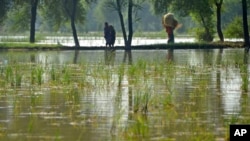Months of the heaviest monsoon rainfall in living memory have caused a disaster in Pakistan. Several provinces have seen rainfall as much as 500 percent above average, causing severe flooding and landslides.
United Nations Secretary-General Antonio Guterres said that “The Pakistani people are facing a monsoon on steroids.” Indeed, since mid-June, some 33 million people, about 15 percent of Pakistan’s population, have been affected by the disaster. Nearly 1,400 people have died, nearly 13,000 have been injured. Entire towns and villages have been razed by mudslides or swamped by raging waters. The U.S. Agency for International Development, or USAID, estimates that more than one and a half million homes have been damaged or destroyed, and approximately 753,000 livestock – a major source of livelihoods and food – have been lost. The flooding has damaged roads and well over 800,000 hectares [two million acres] of agricultural land.
Balochistan, Khyber, Pakhtunkhwa, Punjab, and Sindh provinces have been particularly hard hit. In Sindh province, the flooding Indus River has overflowed its banks and spread widely across the land, drowning fields, killing livestock, and creating a 100 kilometer [62 mile] lake.
The flooding is expected to continue in the near future. According to the World Health Organization, this means that the crisis will get worse as hunger sets in and diseases such as cholera, malaria, dengue, and diarrheal illnesses begin to infect people in the flood zones. More than three million children and thousands of pregnant women are particularly at risk.
In a meeting with Pakistan Foreign Minister Bilawal Bhutto Zardari, Secretary of State Blinken announced an additional $10 million in food security assistance. This funding will provide urgent supplies, like seeds and fertilizer, to help farmers recover, and provide assistance repairing critical irrigation infrastructure damaged by the floods.
The United States, through USAID, has already provided more than $56 million in humanitarian assistance to help the people of Pakistan. USAID has also deployed a Disaster Assistance Response, or DART Team, which is assessing the damage, identifying priority needs, and coordinating with the Government of Pakistan and humanitarian partners.
The United States is deeply saddened by the devastating loss of life and livelihoods throughout Pakistan. We stand with Pakistan during this difficult time. We urge our friends and allies, and the entire international community, to open their hearts and wallets and help Pakistan recover from this disaster.














